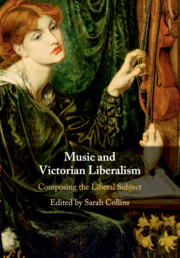Book contents
- Music and Victorian Liberalism
- Music and Victorian Liberalism
- Copyright page
- Contents
- Figures
- Music Examples
- Tables
- Notes on Contributors
- Acknowledgements
- 1 Aesthetic Liberalism
- Part I Cultivation and/as Control
- Part II Dissent, Individualism and Agency
- Part III Character and Emotion
- Selected Bibliography
- Index
- References
Selected Bibliography
Published online by Cambridge University Press: 31 May 2019
- Music and Victorian Liberalism
- Music and Victorian Liberalism
- Copyright page
- Contents
- Figures
- Music Examples
- Tables
- Notes on Contributors
- Acknowledgements
- 1 Aesthetic Liberalism
- Part I Cultivation and/as Control
- Part II Dissent, Individualism and Agency
- Part III Character and Emotion
- Selected Bibliography
- Index
- References
- Type
- Chapter
- Information
- Music and Victorian LiberalismComposing the Liberal Subject, pp. 229 - 250Publisher: Cambridge University PressPrint publication year: 2019

